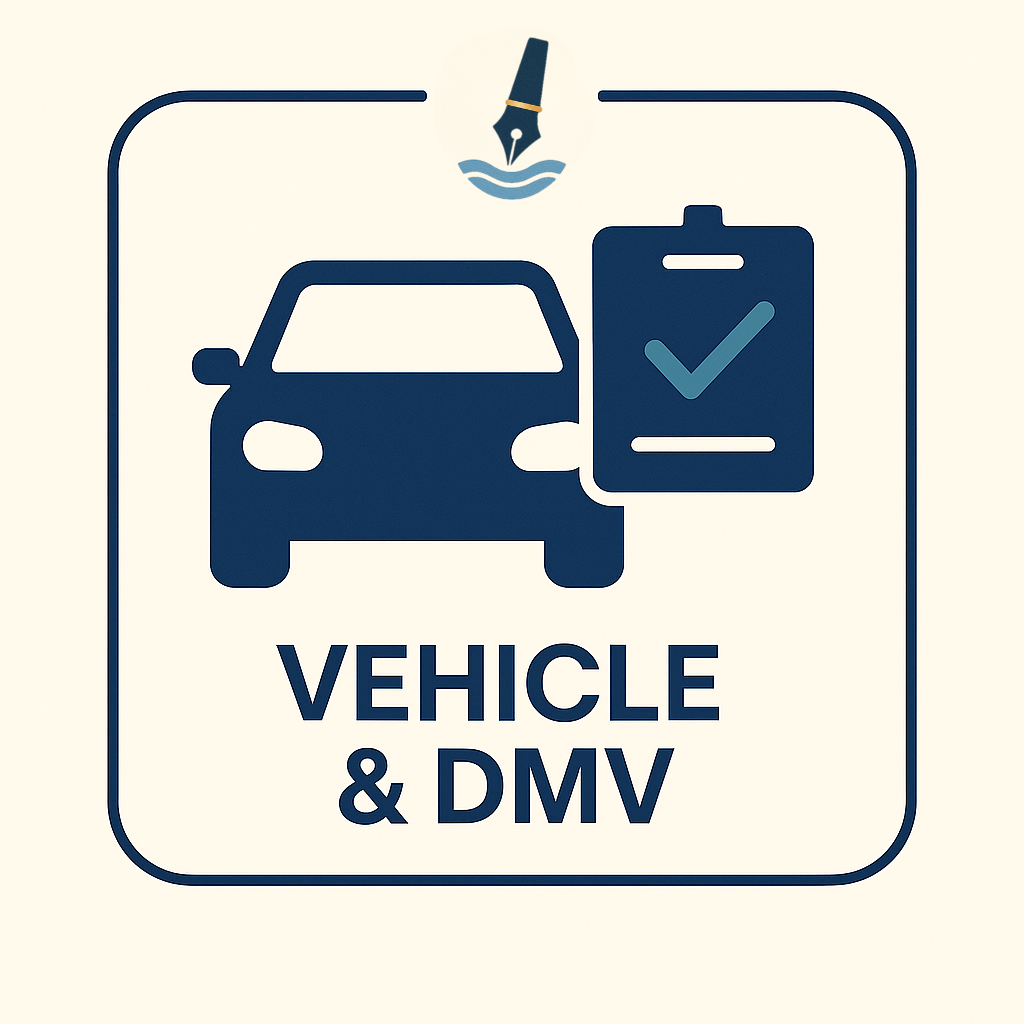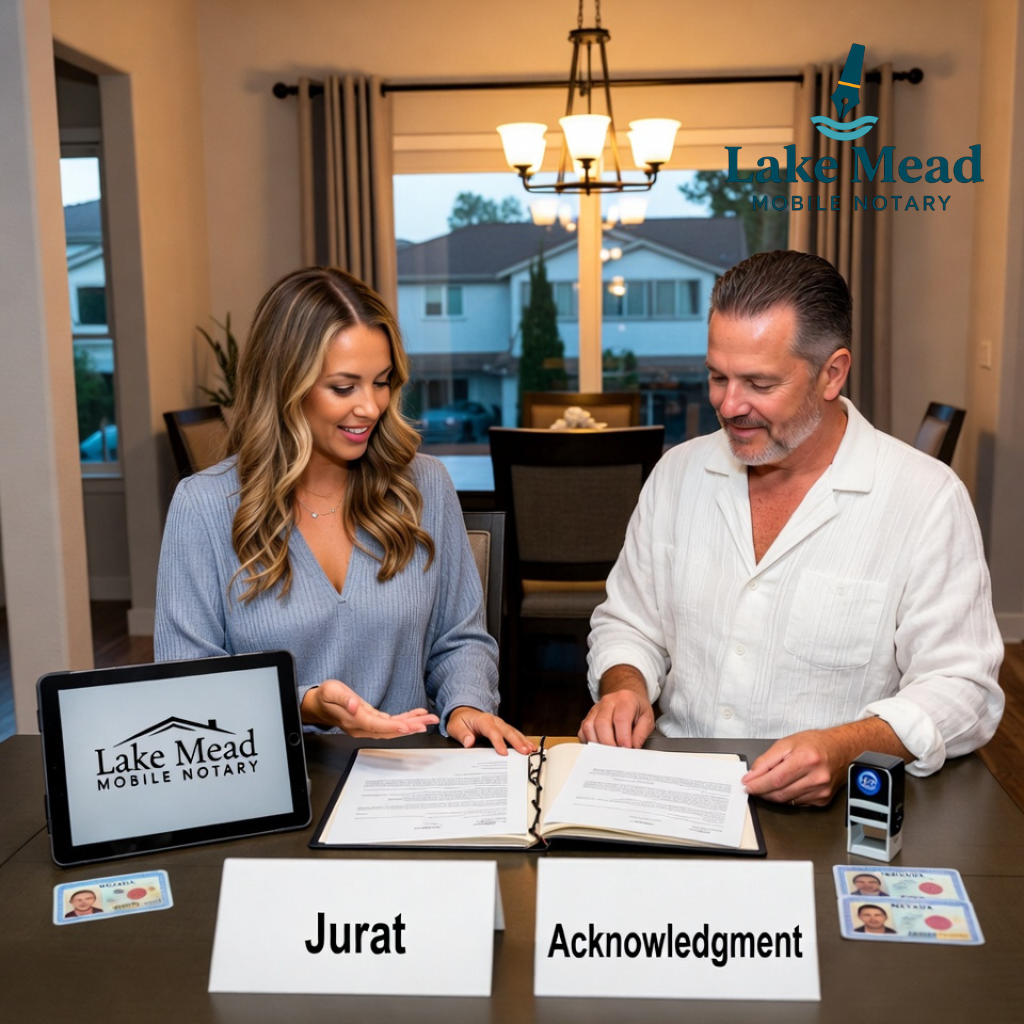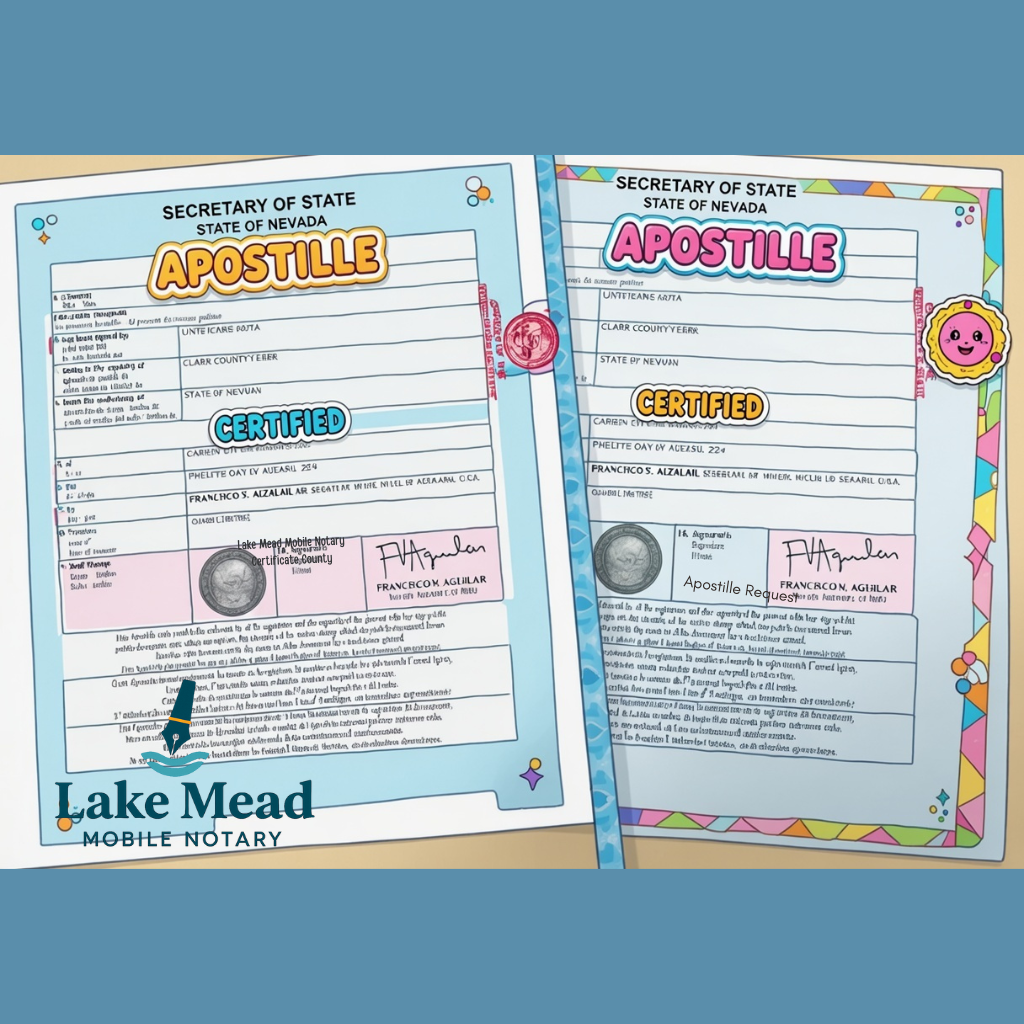Repossession Affidavit Nevada: Complete 2025 Guide for Lienholders & Auto Lenders

A Nevada repossession affidavit is the official sworn statement lienholders must complete and notarize before the Nevada DMV will process a repossession title transfer. Without proper notarization of the VP-020 Repossession Affidavit, auto lenders, finance companies, and repossession agencies cannot legally obtain title to repossessed vehicles or proceed with lien sales to recover unpaid debts. Nevada law requires payments to be at least 30 days past due before repossession can occur, and the VP-020 form certifies that all provisions of NRS 482.516 through 482.518 have been satisfied. Lake Mead Mobile Notary provides same-day mobile notarization for VP-020 affidavits at tow yards, repossession facilities, auto auctions, and lender offices throughout Las Vegas, Henderson, North Las Vegas, and all of Clark County. Licensed Nevada notaries travel directly to your location, verify signer identity, administer the required oath, witness signatures, and complete notarial certificates properly to prevent DMV rejection. Whether processing single repossessions or handling volume accounts for dealerships, auto finance companies, or repo agencies, mobile notary service eliminates delays, reduces storage fees, and ensures compliant execution of all Nevada DMV repossession documentation for title transfers and lien sales.
A Nevada repossession affidavit (VP-020) is the mandatory sworn statement that lienholders, auto finance companies, and repossession agencies must complete and notarize before the Nevada DMV will transfer title on a repossessed vehicle. Lake Mead Mobile Notary provides same-day mobile notarization for VP-020 forms at tow yards, repossession facilities, auto auctions, and lender offices throughout Las Vegas, Henderson, and Clark County with licensed Nevada notaries who travel directly to your location.
Without proper notarization, the DMV will reject your VP-020 and delay title transfer—costing hundreds in additional storage fees, auction delays, and recovery timeline complications. This comprehensive guide covers Nevada repossession affidavit requirements, common mistakes that cause DMV rejection, notarization procedures, and how mobile notary services solve the logistical challenges facing auto lenders and repo companies.
The VP-020 Repossession Affidavit is the official Nevada Department of Motor Vehicles form that documents a lienholder has lawfully repossessed a vehicle according to Nevada Revised Statutes 482.516 through 482.518. This sworn statement serves multiple legal functions:
The VP-020 must include complete vehicle identification (VIN, year, make, model), registered owner information, lienholder details, and the lienholder's Nevada driver's license number, ID number, date of birth, or FEIN for businesses. The form requires notarization with a jurat certificate—meaning the signer must appear before a Nevada notary public, provide identification, and swear or affirm under oath that statements are true.
Understanding Nevada's repossession timeline and legal requirements is critical for completing compliant VP-020 affidavits that the DMV will accept.
Nevada law requires vehicle payments to be at least 30 days past due before a creditor can legally repossess the vehicle. This 30-day period protects borrowers from premature repossession while establishing clear default criteria for lenders. Repossessing before the 30-day window constitutes wrongful repossession under Nevada deceptive trade practice laws.
Nevada permits "self-help" repossession, meaning lienholders can repossess vehicles without court orders—but only if repossession occurs "without breach of the peace". Breach of peace includes:
Violating breach-of-peace rules makes the repossession illegal and exposes the lienholder to civil liability and potential criminal charges.
Nevada requires repossession agents to be licensed by the Nevada Private Investigators Licensing Board, with employees registered and carrying work cards. The exception: buy-here-pay-here dealers repossessing their own vehicles with dealer employees.
After repossession, Nevada law mandates specific notification procedures:
Failure to provide proper notice within 60 days of repossession eliminates the lienholder's ability to pursue deficiency judgments for any remaining balance after vehicle sale.
Based on analysis of repossession documentation issues across Nevada, these errors account for 90%+ of VP-020 rejections:
The VP-020 requires jurat notarization, meaning the signer MUST sign in the physical presence of the notary after taking an oath. Pre-signed forms are automatically invalid and will be rejected by DMV. This happens frequently when lienholders attempt to complete paperwork in advance without understanding notary requirements.
Missing or incorrect VIN, year, make, or model causes immediate rejection. Common issues include:
For individual lienholders, the person named on the lien must sign. For corporate lienholders, only authorized representatives with proper documentation (corporate resolution, power of attorney, or officer authority) can execute the VP-020. Employees without documented authority create invalid affidavits.
The notary must complete the certificate section correctly with:
Missing any element invalidates the notarization.
The Nevada DMV periodically revises forms. Using an outdated VP-020 version results in rejection. Always download the current form from the official Nevada DMV website (dmv.nv.gov/pdfforms/vp020.pdf).
Any changes, corrections, or additions made after the notary seal is applied void the entire document. If errors are discovered after notarization, a completely new VP-020 must be executed with a new notarization.
Step 1: Download Current VP-020 Form
Obtain the most recent version from dmv.nv.gov/pdfforms/vp020.pdf. Verify the revision date (currently 6/2023) to ensure you're using the accepted version.
Step 2: Gather Required Information
Collect complete vehicle details (17-digit VIN, exact year/make/model), registered owner name(s) as shown on title, lienholder business information, and Nevada driver's license/ID/FEIN number for the lienholder.
Step 3: Complete Form Fields (Do NOT Sign Yet)
Fill in all sections completely and legibly. Use black ink if handwriting. Double-check VIN accuracy—this is the most common error. Leave the signature line and notary section completely blank.
Step 4: Prepare Supporting Documentation
Assemble proof of lien (original title showing lienholder or lien contract), repossession authorization documents, and government-issued photo ID for the signer (Nevada driver's license, passport, state ID, or military ID).
Step 5: Schedule Mobile Notary Service
Contact Lake Mead Mobile Notary at (702) 748-7444 or book online at https://lakemeadmobilenotary.com/book. Provide your location (tow yard, repo facility, auction, office) and how many VP-020 forms need notarization. Same-day appointments available throughout Las Vegas, Henderson, and North Las Vegas.
Step 6: Meet Notary at Your Location
The licensed Nevada notary arrives at your designated location with all necessary equipment. Present your valid photo ID and unsigned VP-020 form. For businesses, provide corporate authorization documentation proving signatory authority.
Step 7: Identity Verification & Oath Administration
The notary examines your ID to verify identity and authority to sign. Nevada law requires jurats to include an oath or affirmation. The notary will ask: "Do you solemnly swear (or affirm) that the statements in this affidavit are true and correct to the best of your knowledge?"
Step 8: Sign in Notary's Presence
After taking the oath, sign the VP-020 exactly as your name appears on your identification document. The notary witnesses your signature in real-time.
Step 9: Notary Completes Certificate & Applies Seal
The notary fills in the jurat certificate section with the notarization date, your name, the Nevada county where the oath occurred, and applies their official Nevada notary seal and signature. The entire process typically takes 15-20 minutes per form.
Step 10: Submit to Nevada DMV
Take the notarized VP-020 to any Nevada DMV office along with proof of lien, original vehicle title (if available), and any required fees. The DMV will process the repossession title application, transferring ownership from the registered owner to the lienholder for resale purposes.
Auto Finance Companies & Banks: Capital One Auto Finance, Ally Financial, Wells Fargo Dealer Services, Santander Consumer USA, Credit Acceptance Corp, and regional credit unions processing repossessions on defaulted auto loans.
Buy-Here-Pay-Here Dealerships: Independent dealers providing in-house financing who must recover vehicles from non-paying buyers.
Repossession Agencies: Licensed repo companies including Recovery Network of Nevada, AAA Action Towing, and regional repossession firms acting as agents for lienholders.
Tow Yard Operators: Facilities storing repossessed vehicles who need notarized documentation before releasing vehicles to auction or facilitating lien sales.
Auto Auction Houses: Copart Las Vegas, IAA Las Vegas, and Manheim Nevada requiring properly notarized VP-020 forms before accepting repossessed vehicles for auction.
Private Lenders: Individuals or small businesses who provided vehicle financing and need to recover collateral after buyer default.
Every day of delay in completing VP-020 notarization costs lienholders money in storage fees and extends recovery timelines:
Tow Yard Storage Fees: Nevada tow yards charge $25-50 per day for vehicle storage. A 3-day notarization delay adds $75-150 in avoidable costs. At 30 days, storage fees alone reach $750-1,500—often exceeding the vehicle's auction value for older or damaged cars.
Lien Sale Deadlines: After 30 days in storage, lienholders can proceed with lien sales. After 60 days in some jurisdictions, personal property in vehicles may be disposed of. Notarization delays push these timelines back, extending the capital tie-up period.
Auction Scheduling: Major auction houses operate on weekly schedules. Missing a notarization deadline for Thursday's auction means waiting another week—adding 7 days of storage costs and delaying fund recovery by a full week.
Title Processing Time: Nevada DMV requires 6-8 weeks to process repossession titles after VP-020 submission. Starting this clock earlier through same-day notarization accelerates the entire recovery timeline.
Lost Revenue Calculation: For a $12,000 vehicle at 6% annual interest opportunity cost, each month of delay costs the lender $60 in lost returns. Combined with storage fees, the total monthly cost of delayed notarization can exceed $300-400 per vehicle.
Traditional notarization requires lienholders or repo agents to travel to notary offices during business hours—creating logistical nightmares for companies operating 24/7 repo schedules, managing multiple tow yard locations, and processing high volumes of vehicles.
Lake Mead Mobile Notary travels directly to tow yard locations throughout Clark County including facilities in Spring Valley, Sunrise Manor, Paradise, and Enterprise. We coordinate with facility managers, meet at office locations or cashier windows, and complete all notarizations on-site while vehicles remain secured.
Auto finance companies and repossession agencies processing multiple vehicles benefit from volume pricing and batch notarization appointments. We can notarize 5, 10, or 20+ VP-020 forms in a single on-site visit, eliminating per-vehicle travel costs and minimizing operational disruption.
Repossession operations don't stop at 5pm. We offer after-hours and weekend notarization appointments to accommodate repo company schedules, auction deadlines, and urgent title processing needs.
We provide notarization services at major Clark County auction facilities including Copart Las Vegas, IAA Las Vegas, and Manheim Nevada, ensuring VP-020 affidavits are executed correctly before vehicles enter auction lanes.
Yes, but only if the employee has documented authorization to act on behalf of the lienholder entity. Acceptable proof includes corporate resolution naming the employee as authorized signatory, power of attorney specifically granting vehicle transaction authority, or officer status verified through Nevada Secretary of State business filings. The notary must verify this authority in addition to the signer's identity. Employees without proper documentation create invalid affidavits that DMV will reject.
Repossessing a vehicle before payments are 30 days past due constitutes wrongful repossession under Nevada law and is classified as a deceptive trade practice. The VP-020 cannot truthfully certify compliance with NRS 482.516-482.518 because the repossession was premature. Signing a false affidavit constitutes perjury. Lienholders who wrongfully repossess face civil liability, potential consumer lawsuit damages, and attorney fee shifting provisions that make the repossessor pay the consumer's legal costs. If you discover a vehicle was repossessed too early, consult with legal counsel before proceeding with title transfer.
Yes. Each vehicle requires its own complete VP-020 Repossession Affidavit with specific VIN, vehicle details, owner information, and separate notarization. Mobile notary services can process multiple VP-020 forms in a single appointment at tow yards or repo facilities, but each form must be individually completed and notarized. Volume pricing is available for lienholders processing multiple repossessions simultaneously.
Standard VP-020 notarization takes 15-20 minutes per form, including identity verification, oath administration, signature witnessing, and notarial certificate completion. For volume accounts processing 5-10 vehicles, expect 90-120 minutes total. Same-day mobile notary appointments are available with 1-2 hour response times throughout Las Vegas Valley.
While Nevada permits remote online notarization for some documents, many lienholders and DMV offices require traditional "wet ink" notarization with a physical Nevada notary seal for VP-020 forms. Mobile notary service provides the same convenience as RON without technology barriers, identity verification complications, or potential DMV rejection concerns. Contact Lake Mead Mobile Notary to discuss your specific situation and DMV acceptance requirements.
🚛 Tow Yard Notarization Service
On-site mobile notarization at tow yards, impound lots, and repossession facilities throughout Las Vegas for vehicle release forms, storage affidavits, and lien documents.
📋 VP-147 Lien Sale Affidavit Notarization
Nevada DMV lien sale affidavit notarization for tow yards, repair shops, and storage facilities recovering unpaid charges through vehicle lien sales.
📝 Bill of Sale Notarization
Vehicle bill of sale notarization for private sales, repo auction purchases, and ownership transfer documentation.
🏦 Auto Loan Document Notarization
Notarization of vehicle financing agreements, installment contracts, security agreements, and lending documentation for dealerships and private lenders.
⚖️ Affidavit Notarization Services
Professional notarization of all Nevada DMV affidavits including VP-019 Erasure Affidavits, VP-024 small estate vehicle transfers, and VP-185 statement of facts.












